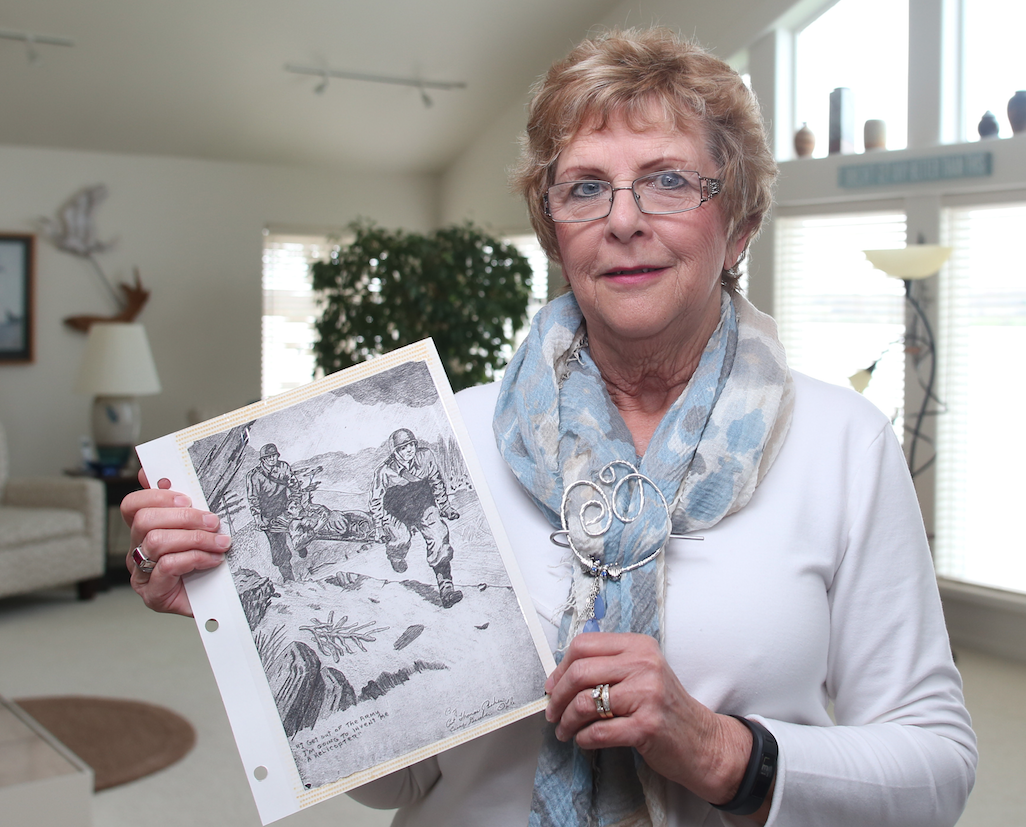Staff Sgt. Thomas L. Baker’s drawings captured the horrors of war in Europe

By Sean Barron
LAKE MILTON
While serving four years in the Army during World War II, staff Sgt. Thomas L. Baker played vital roles in fighting on behalf of the Allies against the Germans, but that didn’t mean his days were devoid of down time.
It was in those times that another passion took shape: drawing.
“In the foxholes, it was cold, and he would doodle to pass the time,” said Margaret Baker of Austintown, who married Baker in 1975.
Judging from the crammed scrapbooks that his daughter, Sue Lemmon, has kept over the years, however, it appears that he did more than merely doodle. Lemmon and Margaret Baker spoke recently from Lemmon’s Northeast River Road home about Thomas Baker’s drawings and relics, along with several of his core achievements during and after his military service.
To that end, Lemmon had on hand more than 100 of her late father’s black-and-white portraits.
Despite his lack of formal training in art, Baker had drawn a series of detailed caricatures, many of which capture the hardships of war as he saw them. One shows two soldiers carrying an injured comrade off the battlefield in a stretcher; another dramatic drawing is of a German tank on top of two American soldiers.
In addition, she brought out a wooden carbine rifle in pristine condition, a bayonet and a knife that belonged to Baker, who served in Company H, 242nd Infantry Regiment, 42nd Rainbow Division after having been drafted into the Army in 1942 at age 19. He spent much of WWII in the European Theater, including along the western coast of Italy, Marseilles, France, and north of Switzerland before arriving in an area between France and Germany.
During a gunfight with and surrounded by the Germans during the Battle of the Bulge in Hatten, Germany, Baker was shot in the leg while on a rooftop. Since no doctor was in the vicinity, one of his men had to extract the bullet by hand and place sulfur on the injury.
Toward the end of the war, Baker, who had been promoted to lieutenant, arrived with his soldiers at Dachau, a concentration camp near Munich. There, the troops gave supplies to some of the prisoners to help them survive.
For his bravery and leadership during the battle, the National Order of Battlefield Commissions gave Baker the Battlefield Commission Award on March 10, 1945.
After the war, Baker sidelined his penchant for drawing and wasted no time adapting to civilian life before settling in the Mahoning Valley from the Pittsburgh area, recalled Lemmon, who served four years as a Milton Township trustee and is a longtime member of the township’s Zoning Variance Board.
“After he came back from the service, he went to work right away,” she said. “He came to Lake Milton in 1950.”
After having worked as a coal miner, for a furniture business in Newton Falls and a construction company in downtown Youngstown, Baker, along with two of his brothers, helped build 15 homes around Lake Milton. He also bought a 100-acre farm in the area and converted it to lots, one of which he sold in the early 1950s for $800, Lemmon said, adding the property is now worth about $300,000.
After spending time in the real-estate business in which his specialty was selling lakefront, commercial and suburban property, Baker helped found the Baker Moore Baker Co. That insurance business was the result of a merger with a real-estate company, and it sold policies for many Lake Milton homes for 25 to 30 years, Lemmon continued.
Baker worked until he was 75, his daughter added. Before her father died in 2006 at age 83, he had left a positive and indelible mark on many people’s lives, Lemmon said.
“He had a great sense of humor,” she recalled. “He had a great way with words.”
“I still miss him; he was the best husband,” Margaret said, fighting back tears. “He was very kind and considerate and respected women. He was congenial and easy to get along with.”
 43
43
